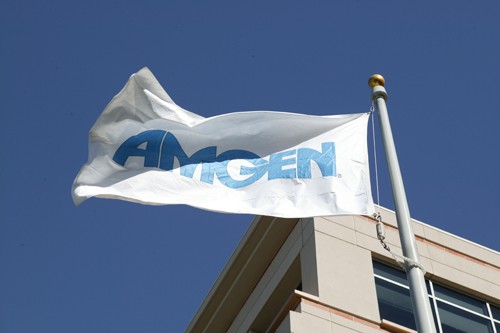
Amgen has announced new data showing its first-in-class asthma drug tezepelumab reduced exacerbations and improved lung function in patients with severe, uncontrolled asthma and comorbid nasal polyps.
Up to 22% of people with severe asthma have comorbid nasal polyps, which can block nasal passages and lead to breathing problems, reduction in the sense of smell, sleep disturbance and other adverse effects on quality of life.
In the pivotal NAVIGATOR phase 3 trial tezepelumab achieved an 86% reduction in exacerbations as well as improved lung function, seeing an increase in forced expiratory volume (FEV1) of 0.20 L compared to placebo when added to standard-of-care (SoC) in patients with nasal polyps. Tezepelumab also achieved a clinically relevant improvement in nasal polyp symptoms at week 52.
In patients with severe asthma without nasal polyps, the reduction in exacerbations was 52% and the improvement in FEV1 was 0.13 L. The trial reported no clinically meaningful differences in safety between the tezepelumab and placebo groups.
Tezepelumab, which is being codeveloped with AstraZeneca, works on the primary source of inflammation, the airway epithelium, the first point of contact for viruses, allergens, pollutants and other environmental insults. It targets thymic stromal lymphopoietin (TSLP), an epithelial cytokine, and has the potential to treat a broad population of patients with severe asthma.
In July, the FDA accepted tezepelumab for priority review in severe asthma based on the PATHFINDER clinical programme, which includes the NAVIGATOR trial, with a prescription drug user fee act (PDUFA) target date for the first quarter of 2022 for the application. The FDA previously granted breakthrough therapy designation to tezepelumab in September 2018.
Welcoming the results, David Reese, R&D EVP at Amgen, said: “These results further strengthen our confidence in tezepelumab’s potential to address a significant unmet need across a broad population of patients with severe asthma, including those with comorbid nasal polyps. We look forward to bringing this potentially transformative treatment to patients soon.”
A phase 3 clinical trial, WAYPOINT, has been initiated to explore the efficacy and safety of tezepelumab in adults with severe, chronic rhinosinusitis with nasal polyps.
Globally, there are approximately 2.5 million patients with severe asthma that is uncontrolled or biologic eligible. Poor asthma control is debilitating, with patients experiencing frequent exacerbations, significant limitations on lung function and a reduced quality of life.




